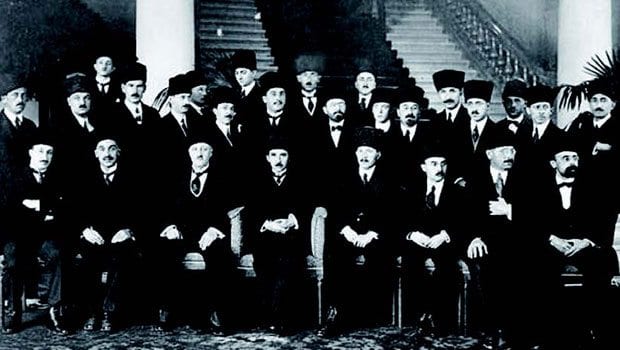Kimden: a.gee@hispeed.ch [mailto:a.gee@hispeed.ch]
Written by DR. PAT WALSH
Assistant Professor. Trinity College. Dept. of History. Dublin
2016-10-04
ON THE DEFEAT OF ENGLAND AT LAUSANNE BY ATATURK
“It is an old policy of England to sacrifice her friends to her enemies. The idea is that your friend is your friend, and will support you anyhow. Your enemy will be so pleased at being allowed to punish your friend that he will forget his old grudge against you, and perhaps himself become friendly. And the policy is often successful enough, especially when the friend is helpless and the enemy placable.”
The Lausanne Peace Treaty was negotiated with long and hard deliberation spread over an eight-month period (the Turkish delegation withdrew for a three-month interruption in the middle of the proceedings when it was not happy with what was happening). Turkey refused to have terms imposed upon her that would dilute her sovereignty, even though Britain fought tooth and nail to maximize her Imperial influence over the region. The Turkish delegation also refused to be railroaded into a take it or leave it deal imposed by an arbitrary deadline. When Curzon said his train was standing at the station and it was “now or never” the treaty remained unsigned by the Turks. Curzon, after delaying his train in the expectation they would submit, left empty handed on his train.
In early March 1923, a Turkish note suggested new propositions towards the still unsettled financial, economic, and judicial questions. Curzon accepted the Turkish proposals on the basis that the conference would be revived although he ruled out any further revisions of the territorial clauses already resolved. Between 21–27 March 1923, British, French, Italian, and Japanese experts met in London to discuss Allied criteria for the settlement of the still unresolved issues of the conference.
The conference eventually reopened at Lausanne on 23 April 1923. Once again three commissions were set up: the first dealing with the remaining territorial questions and the rights for foreigners, which was chaired by Sir Horace Rumbold, the primary British delegate as Curzon refused to return to Lausanne and the Treaty was signed on July 24th 1923. It had, indeed, been a grave surrender on the part of British representatives.
For the first time in the world history, the West bowed its head in front of the East and the extend of the western colonialist politics was stopped at the doorstep of Asia.
Lausanne Peace Treaty is the only uninterrupted treaty of the 20th century, lasting 96 years long. Within next 4 years, it will be 100 years young.
Bazi kimseler maalesef, hic düsünmeden, arastirmadan, sanki Lausanne anlasmasi hakkinda yazili baska eser yokmus gibi, tarihci gecinen bir kimsenin yazdigi Lozan. Hizmet mi? Hezimet mi? kitabinin akintisina kapilarak Lausanne kahramani diye bilinen Ismet Inönü’yü, sanki kendileri cok iyi bilirlermis gibi, cekinmeden, daha ileri gidip, vatan haini olarak vasiflandiriyorlar.
Onlarin asil hedefi Ismet Inönü degil, Atatürk.
Azmi Güran. Ph.D. (U of P), Prof.Eng.
Kitaplar.odt
